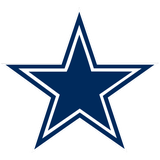
Dallas Cowboys: Team Can Afford to be Cautious With Dez Bryant

Dez Bryant might be one of the most dominant receivers in the game, but the Dallas Cowboys shouldn’t feel a need to rush him back from injury.
The Dallas Cowboys played their most complete game of the season so far in Week 3, beating the Chicago Bears 31-17 on Sunday night. The contest featured breakthrough performances from rookie quarterback Dak Prescott and rookie running back Ezekiel Elliott, as well as a strong defensive effort.
Unfortunately, the game also saw star wideout Dez Bryant injured early. He limped off the field in the first quarter, but returned to finish the game and secure his first touchdown reception of the game. For a time, it looked like Bryant might avoid the injury altogether.
However, the Cowboys announced on Wednesday that Bryant has a hairline fracture in his knee. His status for their Week 4 game against the San Francisco 49ers is uncertain.
“He has a slight hairline fracture in one of the bones in his knees,” Cowboys head coach Jason Garrett said, per Matt Maiocco of CSNBayArea.com. “We don’t think it’s something that’s going to keep him out for an extended period of time, but it’s going to be a day-by-day, week-by-week situation.”
NFL Media’s Ian Rapoport reports that Bryant isn’t practicing, but that there is a chance he could play against the 49ers:
#Cowboys WR Dez Bryant has stayed off his knee, on crutches today. How he responds to treatment to game-time will determine whether he plays
— Ian Rapoport (@RapSheet) September 28, 2016
What the Cowboys need to keep in mind as they evaluate Bryant is that this team is built in a way that it can survive without him for a week.
Dallas is featuring a very balanced offense right now. The team has run 101 rushing plays and Prescott has attempted 99 passes. The Cowboys don’t need to lean on Bryant in order to win—and they haven’t been dong so.
It seems that Prescott’s favorite target right now is Cole Beasley, who has been targeted 25 times to 21 targets for Bryant, according to Pro Football Focus. Beasley is healthy, as is tight end Jason Witten. Both Witten (14) and Beasley (20) have more receptions than Bryant (11). The Cowboys also have wideout Terrance Williams, who has just four fewer receptions and 28 fewer yards than Bryant. The point is, the Cowboys have targets for the passing game even without Bryant.
More importantly, the team has a number of strong rushing options. Elliott has already racked up 274 yards rushing on the season. Prescott is averaging 7.7 yards per carry from the quarterback position. Backup running backs Alfred Morris and Lance Dunbar provide depth in the ground game as well.
Dallas can afford to skew their offensive gameplan a bit toward the run. The trick will be playing well enough on defense to continue to afford doing so. Rod Marinelli’s defense currently ranks 22nd in the league with 379.3 yards allowed per game. Forcing turnovers and creating critical stops has to be key if the Cowboys continue giving up yardage.
The good news for this week, though, is that Dallas isn’t exactly facing an offensive juggernaut. San Francisco is averaging just 292 yards per game offensively and is rated dead last in overall offense by Pro Football Focus.
Running hard, playing opportunistic defense, and making a few plays in the passing game should be enough for Dallas to beat San Francisco, even if Bryant cannot go. This is precisely why the Cowboys shouldn’t—and really can’t afford to—rush Bryant back onto the playing field. The fracture in his knee cannot possibly be too serious if the Cowboys are considering letting Bryant play. It’s still a fracture, however, and there is a risk of further injury.
Dallas shouldn’t take the chance, especially with games against the Cincinnati Bengals and Green Bay Packers looming in the following weeks. If the risk of complicating the injury is still significant in those games, the Cowboys should try playing without him too. Dallas’ bye comes in Week 7 with all four remaining NFC East matchups coming after on the schedule.
More from NFL Spin Zone
This article originally appeared on











